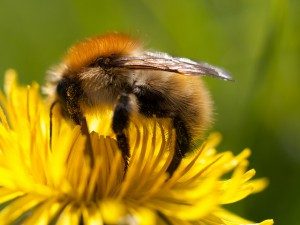
What do you think of when I say “bee?” Bees are scary because bee stings hurt! Think about this: “we can’t eat if we don’t have the bees flying around pollinating – even if they sting.”
Most of us have taken bees for granted, and we have not protected these very important pollinators.
In the 11th hour, just about every country in the world is making positive strides to help the bees survive extinction from farm and lawn chemicals that have been mass marketed by big corporations like Monsanto.
Honey bees are now an endangered species because of US – people and bees are a critical key to our survival. So, if bees are endangered, WE ARE ENDANGERED.
There is NO TIME to waste debating this – we must take action NOW to stop a mass die-off of bees that’s happening right now.
What’s Killing The Bees
We can blame farm and garden chemicals, corporate farming, and human dis-interest. The use of a class of insecticides known as neonicotinoids is the primary toxin responsible for the rapid die-off of honey bees. The systemic residues of these pesticides not only contaminate pollen, nectar, and the wider bio-system, but they have repeatedly been identified as highly toxic to honey bees in scientific studies.
When exposed to neonicotinoids, merely after one out of three bites of pollen, bees and other pollinating species can die. Many people warned that this decline was coming, but NOTHING was done about it.
Monsanto-Big-Corps kept selling more GMO seeds that require farmers keep spraying more chemicals on their crops. We have “waited and debated” this issue until it’s too late. Mounting scientific evidence, along with unprecedented annual bee colony losses at 40 to 90 percent this year, demonstrate the fatal impacts that these pesticides are having on these fragile species.
4 Ways We Can Help The Bees
From April McCarthy, It’s Time To Protect Our Bees, July 23, 2013. WakingTimes
- Cut Back (or completely eliminate) Lawn Pesticides and Fertilizers – Many common lawn and garden chemicals are lethal to bees, while others may weaken their immune systems, allowing parasites, disease or other stresses to finish them off. Instead, switch to a strategy of integrated pest management or opt for natural, organic fertilizers and biological controls.
- Cultivate Bee-Friendly Plants – Just as many plants need bees for pollination, bees need plants for nectar and pollen. Not anything green will do, however. In fact, bees tend to be attracted to blue, purple and yellow flowers. Consult with your local nursery or non-Monsanto university extension to select appropriate varieties for your area (and view a suggested list here). Research shows gardens with 10 or more bee-friendly plants support the most visitors.
- Let There Be Weeds – Many common weeds, such as dandelions and clover, are popular with bees. Go ahead and let some flower, then to keep things tidy, pull them up after they’ve gone to seed. And avoid too much mulch. Many native bees tunnel and live in the soil, but can be blocked by heavy layers of woodchips or plastic liners. Learn to edge your lawn tastefully without completely shutting out bees.
- Help Your Town Protect Bee Habitat – Some of the biggest threats to bees are urban sprawl and intensive land management. But you can reduce this trend by volunteering to plant wildflowers and other native vegetation along roadways and other common areas, and advocating for smart growth and sensible limits to development where you live.
You never know what else may be nibbling on deadly pesticides …

________________
If you want to learn more about healthy living, contact me at janethull.com. Remember that you are never alone when you are looking for good health!
_____________
Disclaimer: This article is for informational purposes only, and is educational in nature. The FDA may not have evaluated some of the statements. This article is not intended to diagnose, treat, cure, or prevent any disease. Please discuss with your own, qualified health care provider before adding supplements or making any changes to your dietary program.
Before taking vitamins, consult your doctor; pre-existing medical conditions or medications you are taking can affect how your body responds to multivitamins.
You have our permission to reprint this article if you attribute us with a live back-link to this article https://janethull.com/